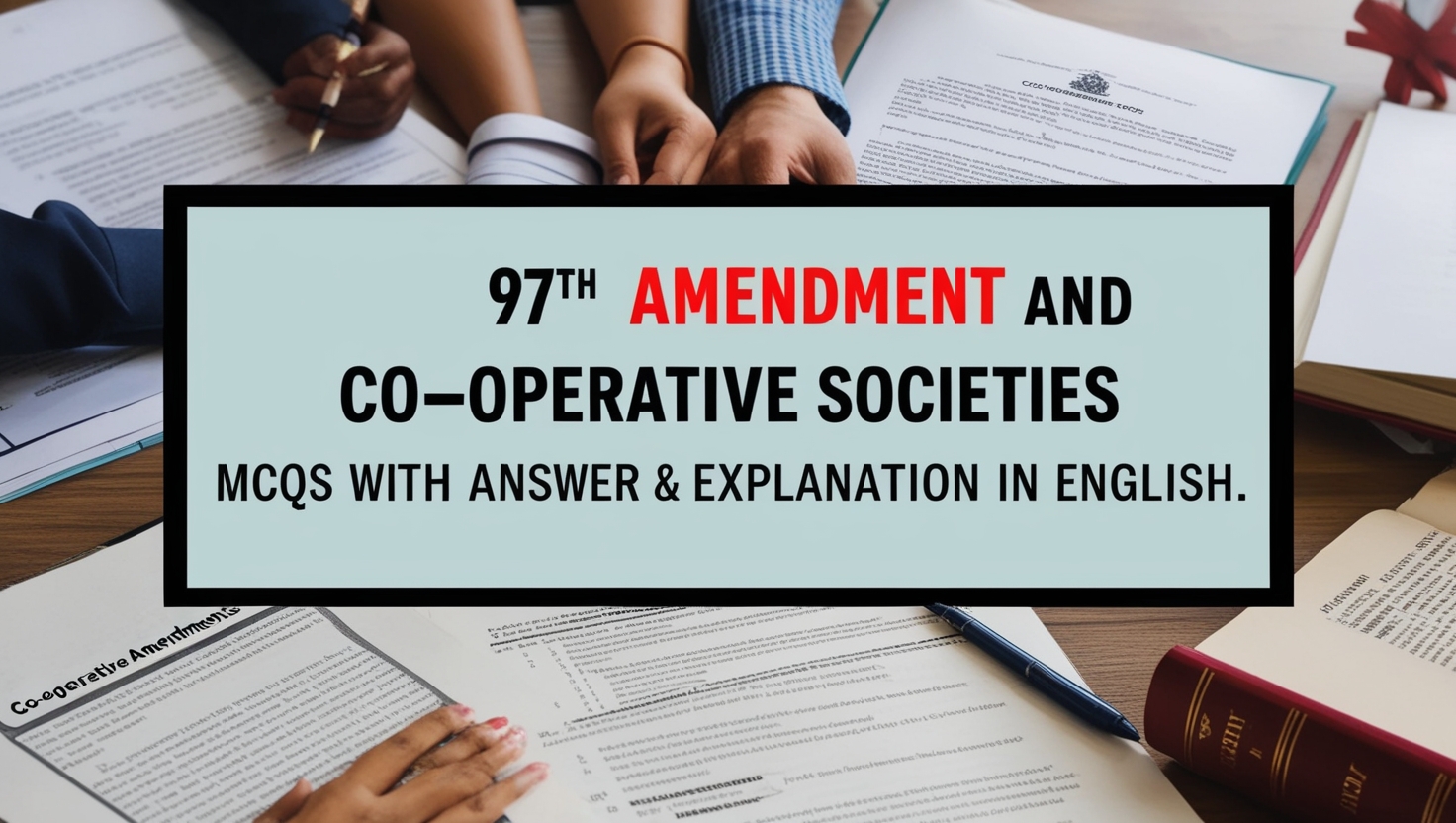
The 97th Amendment of the Indian Constitution focuses on the promotion of co-operative societies, recognizing them as essential for the development of the economy. In this article, titled 97th Amendment and Co-operative Societies GK MCQs With Answer & Explanation in English, we present a collection of important multiple-choice questions to help you understand the significance of the amendment and its impact on co-operative societies.
These MCQs are accompanied by detailed explanations to enhance your learning and preparation for competitive exams.
1. Which article of the constitution gave constitutional status and protection to co-operative societies?
- 95th Constitutional Amendment Act
- 96th Constitutional Amendment Act
- 97th Constitutional Amendment Act
- 98th Constitutional Amendment Act
Show Answer
Answer: 97th Constitutional Amendment Act
The 97th Constitutional Amendment Act of 2011, which was enacted in India, granted constitutional status and protection to cooperative societies. Cooperative societies have played a vital role in various sectors of the national economy and have experienced substantial growth. This amendment was introduced to strengthen and streamline the functioning of these societies.
2. Which article of the constitution made the right to form co-operative societies a fundamental right?
- Article 16
- Article 17
- Article 18
- Article 19
Show Answer
Answer: Article 19
Article 19 of the Constitution of India made the right to form co-operative societies a fundamental right. Part IX-B of the Constitution of India contains provisions with respect to the cooperative societies.
3. Which of the following articles are related to the cooperative societies?
- Articles 243-ZH to 243-ZT
- Articles 233-ZH to 233-ZT
- Articles 223-ZH to 223-ZT
- Articles 213-ZH to 213-ZT
Show Answer
Answer: Articles 243-ZH to 243-ZT
The 97th Constitutional Amendment Act of 2011 added a new Part IX-B in the Constitution of India, which is entitled “The Co-operative Societies” enumerated in Articles 243-ZH to 243-ZT.
4. Which article of the Directive Principles of State Policy promotes the formation of Cooperative Societies?
- Article 39-B
- Article 43-B
- Article 44
- Article 45
Show Answer
Answer: Article 43-B
The 97th Constitutional Amendment Act of 2011, which gave constitutional status and protection to co-operative societies, is included in Article 43-B of the Directive Principles of State Policy.
5. Who has the right to make provisions for the incorporation, regulation, and winding-up of co-operative societies?
- Lok Sabha
- Rajya Sabha
- Parliament
- State Legislature
Show Answer
Answer: State Legislature
The state legislature in India is empowered to make provisions for the incorporation, regulation, and winding-up of co-operative societies based on the principles of voluntary formation, democratic member control, member economic participation, and autonomous functioning.
6. Which of the following decides the number of members on the board of cooperative societies?
- President
- Parliament
- Governor
- State Legislature
Show Answer
Answer: State Legislature
The 97th Constitutional Amendment Act of the year 2011 gave constitutional status to cooperative societies. The board of cooperative societies shall consist of such a number of directors as may be provided by the concerned state legislature.
7. What is the maximum number of directors a co-operative society can have?
- 15
- 20
- 21
- 25
Show Answer
Answer: 21
The maximum number of directors in a co-operative society shall not exceed twenty-one. The legislature of the state can also make provisions for the co-option of persons having experience in the field of banking, management, finance, or specialization in any other related field as members of the board.
8. How many seats are reserved for women on the board of every co-operative society?
- 1
- 2
- 3
- 5
Show Answer
Answer: 2
The legislature of the state has the power to provide for the reservation of one seat for the Scheduled Castes or the Scheduled Tribes and two seats for women on the board of every co-operative society in India having members from such a category of persons.
9. What is the term of office of elected members of the board of cooperative societies?
- 2 years
- 3 years
- 4 years
- 5 years
Show Answer
Answer: 5 years
The term of office of elected members of the board of cooperative societies in India and its office bearers shall be five years from the date of election. The maximum number of directors of a co-operative society shall not exceed twenty-one.
10. The board of cooperative societies may be superseded or kept under suspension in which of the following cases?
1. Of its persistent default
2. Of negligence in the performance of its duties
3. Of there being a stalemate in the constitution or functions of the board
4. Select the correct option from the codes given below:
Choose the correct option from the codes given below
- Only 1 & 2
- Only 2 & 3
- Only 1 & 3
- 1, 2 & 3
Show Answer
Answer: 1, 2 & 3
Some of the cases in which the board of cooperative societies may be superseded or kept under suspension are: (1) Of its persistent default, (2) Of negligence in the performance of its duties, (3) Of there being a stalemate in the constitution or functions of the board, etc.








Leave a Reply